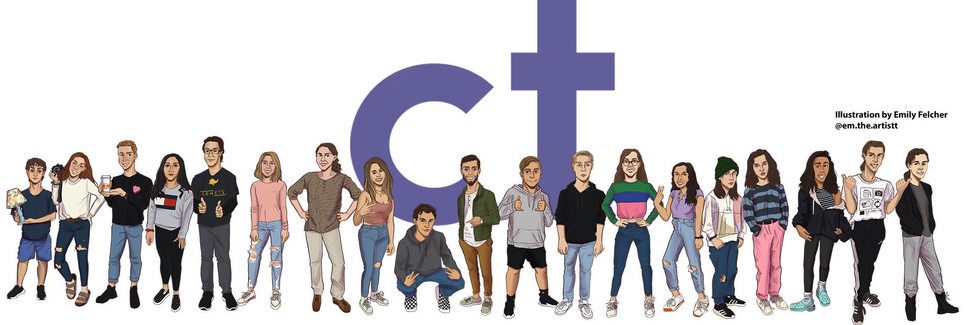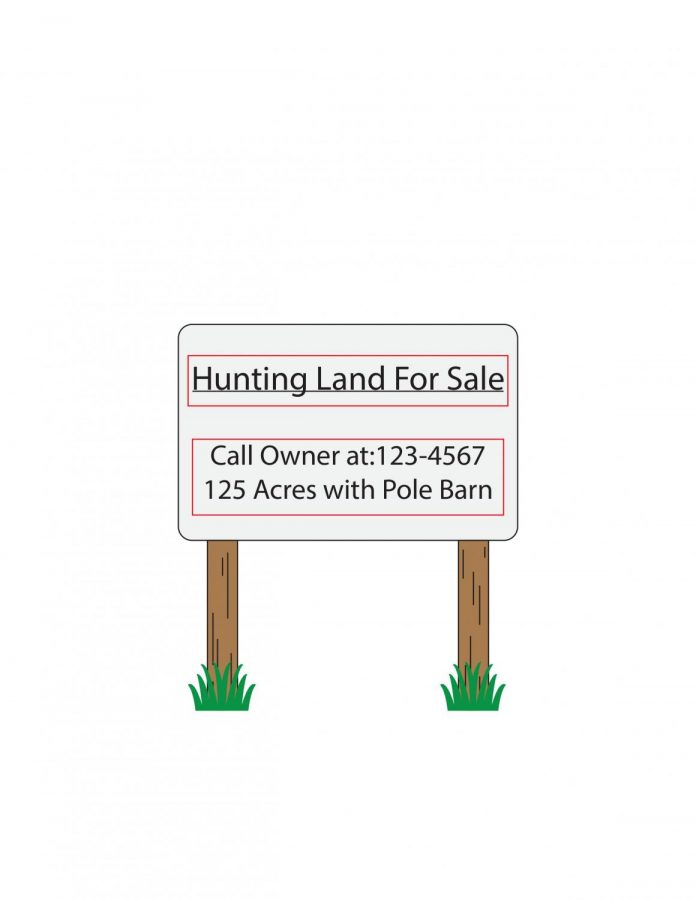It’s Getting Harder to Hunt
The development of subdivisions and hiking of prices are making hunting harder than ever before
Illustration by Jonathan Callison
The hunting land for sale illustration is supposed to represent that the selling of land is one of the problems causing people to stop hunting.
March 15, 2019
The sport of hunting is a difficult type of outdoor recreation. Like fishing, a person is not going to be successful every time. That should be the only difficulty in the sport, but alas, there are more challenges now than ever before.
There are a few reasons why hunting has become a harder sport, with the first being the disappearance of land. Hunting land is being lost to the building of suburban neighborhoods. According to Farm Futures, between 1992 and 2012, almost 31 million acres of farmland were lost, equal to all the farmland in Iowa. Expanding urban areas accounted for 59% of the loss. Losing farmland is the same as losing hunting land, since most of the time hunters are hunting on either crop fields or in wooded areas. A post by Harvest Public Media also presented the same problem. The post stated that since 1980, the amount of land being farmed or grazed in the U.S. has dropped 13 percent, according to the U.S. Department of Agriculture.
“Housing developments in farmlands is definitely a factor, as are the more modern farming practices that leave virtually no brushy cover for wildlife around the edges of fields,” Director of Communications for Safari Club International, Steve Comus said in an interview conducted by the Comets’ Tale. “Although there still are places where that can be done, they are not as common as they were back then. Urban and suburban development certainly impacts the number and convenience of places to go hunting.”
The Comets’ Tale interviewed another outdoorsman from Michigan that had something to say about the disappearance of land and how it may be the selling of private land.
“We have a statute in Michigan that dictates no publically-available hunting land can be sold unless that land is replaced with an equal or greater piece of property in terms of size, experience and opportunities offered,” Public Information Officer and Editor of Michigan Out-of-Doors Magazine, Nick Green said. “Just because a property that your family has hunted on for years, and doesn’t belong to them, now isn’t available, that doesn’t mean hunting land is disappearing. That means that someone else is hunting it or managing it how they see fit. In most cases, it has not disappeared, its availability has changed.”
This is something noticeable in Grand Ledge. Twenty years ago, many of the housing developments and apartments that one can see while driving were not there. Farm fields were replaced by “house fields.” Those places can be found along Saginaw highway, Willow highway, and other areas.
Another culprit behind the difficulties of hunting is the hike in prices for hunting equipment. Since modern day hunting began in the late 1800s, the hunting market has grown into what it is today with brands like Realtree, Bushnell, Smith and Wesson, etc. Hunting brands have evolved the sport by upgrading equipment and updating clothing and other gear. That comes with a price, literally. For many, the prices for gear, licenses, and as previously mentioned, land, have increased potentially driving hunters out of the sport.
“Yes, hunting is getting more expensive, as is about everything else,” Comus said. “Guns and gear are getting more expensive, but in many ways much of the gear is relatively less expensive now than it was years ago. For example, when I was in high school, good hunting shotguns cost between $50 and $100, depending on the model. Now it is possible to get good hunting shotguns for $500 to $600.”
Gear may be expensive, but the product’s price is driven up by two things, quantity and quality. Now, considering that the companies produce enough of the product to sell, quality should remain the only factor that drives the price.
Green also had a few things to say about the increasing price of gear. Cost is not the problem.
“No, I don’t think that the sport of hunting is getting priced out of business,” Green said. “I think that hunters and anglers feel the need to compete. And in the world of social media, it makes competing with and seeing what others are doing, wearing, buying, harvesting, etc. available at our fingertips. We have 4.6 million acres of public land in Michigan and robust populations of small game, deer and waterfowl, as is evident through Michigan DNR reports, that is unheard of anywhere else in the Midwest. Hunting and angling take effort, and I think that is what is becoming lost on many new hunters today. Effort and resourcefulness are what new generations of hunters lack, not money.”
The sport of hunting may be losing hunters due to the fact that hunting is becoming more difficult because of how hunting land is disappearing and prices for gear and other necessities are increasing. This outdoor recreation may be losing hunters who cannot continue hunting under these conditions, but the outdoorsmen and women who truly care about the sport will stay and help it thrive.

